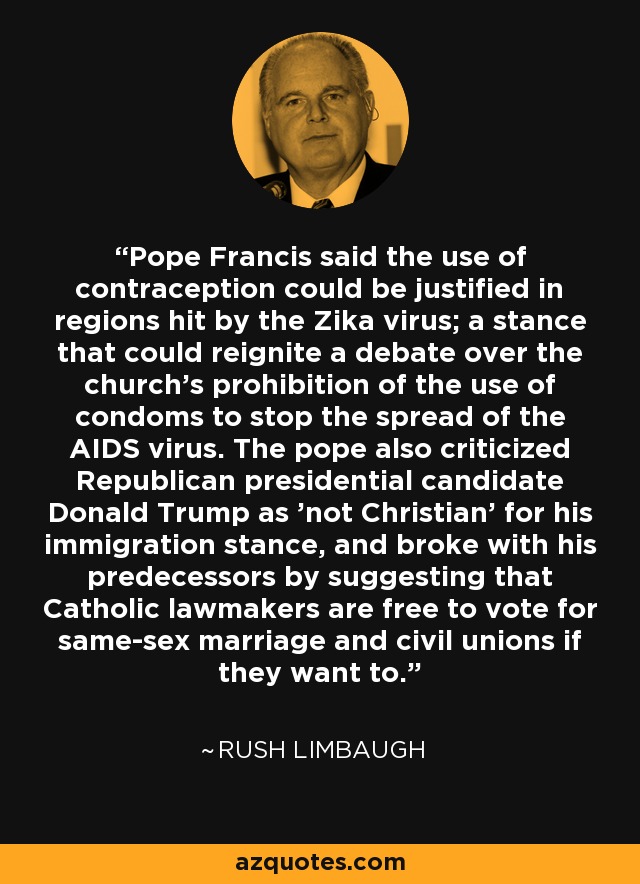Pope Francis, the 266th Pope of the Roman Catholic Church, has been known for his progressive stance on various social issues. Since his election in 2013, he has often emphasized mercy and compassion as central tenets of the Church's teachings. His approach to complex topics such as poverty, climate change, and social justice has garnered both praise and criticism. Among these topics, contraception remains one of the most debated subjects within the Catholic community.
Contraception is a sensitive issue within the Catholic Church, with traditional teachings advocating against its use. However, recent statements by Pope Francis have sparked renewed interest and discussion about the Church’s position on this matter. The Pope’s nuanced views suggest a more compassionate understanding of individual circumstances, reflecting his broader emphasis on pastoral care over rigid doctrine. This evolving perspective invites Catholics worldwide to reconsider how they interpret and apply Church teachings in their daily lives.
In light of global health crises like the Zika virus outbreak, Pope Francis has suggested that contraception may be considered the lesser of two evils when faced with significant risks to maternal and child health. This statement reflects a pragmatic approach towards addressing pressing public health concerns while adhering to core moral principles. It highlights the complexity of balancing doctrinal consistency with practical compassion in modern times.
Understanding the Context of Modern Challenges
The Pope's remarks come amid an era where global health challenges demand innovative solutions. During his visit to Mexico, Pope Francis addressed the Zika virus crisis, emphasizing the importance of safeguarding human life. He recognized that women concerned about having children with birth defects due to the virus might consider contraception as a viable option. This acknowledgment underscores the need for flexibility in applying moral guidelines amidst real-world complexities.
This stance does not represent a complete reversal of the Church's long-standing opposition to artificial contraception but rather highlights the importance of discernment in specific situations. By acknowledging the potential benefits of contraception in preventing severe health issues, Pope Francis aligns himself with a tradition of pastoral care that prioritizes human well-being above all else.
His comments reflect a deeper understanding of the challenges faced by individuals and communities affected by the Zika virus. They also serve as a reminder that moral decisions must always take into account the unique circumstances surrounding each case, encouraging believers to exercise prudence and empathy in their choices.
A Historical Perspective on Church Teachings
In 1968, Pope Paul VI issued the encyclical Humanae Vitae, which reaffirmed the Church's traditional teaching against artificial methods of birth control. This document solidified the Catholic position on contraception, classifying it as an unnatural interference with God's plan for human reproduction. Despite widespread controversy at the time, Humanae Vitae remains a cornerstone of Catholic moral theology.
While Pope Francis respects the legacy of Humanae Vitae, he has introduced a more nuanced interpretation of its implications. By recognizing exceptions based on extraordinary circumstances, such as the threat posed by the Zika virus, he demonstrates a willingness to adapt pastoral guidance without undermining fundamental principles. This approach acknowledges the evolving nature of societal needs while maintaining fidelity to core beliefs.
His reflections invite Catholics to engage in thoughtful dialogue about how best to apply Church teachings in diverse contexts. By fostering open discussions around sensitive topics like contraception, Pope Francis promotes greater awareness and understanding among faithful followers worldwide.
Ecclesial Authority and Moral Discernment
The question of ecclesial authority plays a crucial role in shaping Catholic perspectives on contraception. When asked whether couples could consider using contraceptives under certain conditions, Pope Francis responded affirmatively, highlighting the timeliness of this debate. His response emphasizes the importance of discernment in making informed moral decisions.
By encouraging individuals to seek guidance from trusted spiritual advisors, the Pope reinforces the value of communal support in navigating complex ethical dilemmas. This approach ensures that personal choices align with both individual conscience and established Church teachings. Moreover, it empowers laypeople to participate actively in theological conversations, enriching collective understanding through shared experiences and insights.
Pope Francis' emphasis on pastoral care over legalistic interpretations of doctrine fosters an environment where authentic faith can flourish. Through respectful engagement with differing viewpoints, Catholics are invited to grow in wisdom and charity, ultimately strengthening their relationship with God and neighbor alike.
Criticism Amidst Compassionate Leadership
Despite his compassionate leadership style, Pope Francis has faced criticism from some quarters regarding his stance on contraception. Critics argue that any deviation from strict adherence to traditional teachings undermines the integrity of Catholic doctrine. They fear that allowing exceptions might lead to further erosion of established principles over time.
However, supporters view the Pope's approach as a necessary adaptation to contemporary realities. They believe that embracing flexibility within pastoral practice enables the Church to remain relevant and responsive to changing societal needs. By focusing on the dignity of human life and promoting responsible stewardship of creation, Pope Francis exemplifies what it means to lead with love and understanding.
Ultimately, the ongoing conversation surrounding contraception serves as a testament to the dynamic nature of Catholicism. As new challenges arise, so too do opportunities for growth and renewal within the faith community. Under Pope Francis' guidance, Catholics continue to explore ways of living out their beliefs authentically in today's world.

